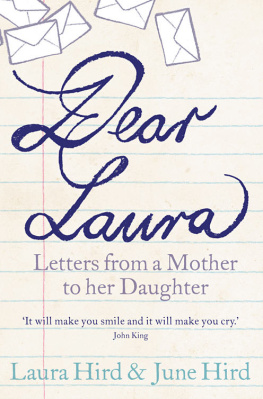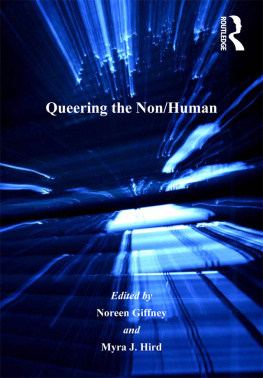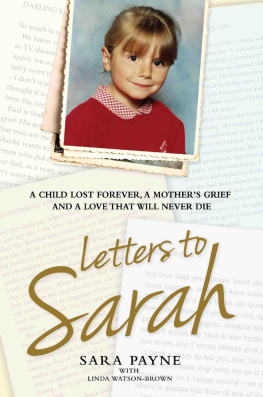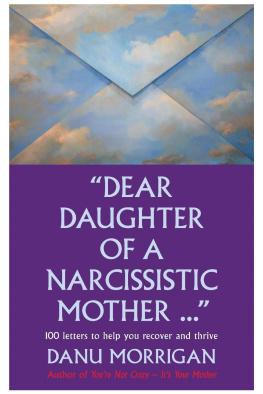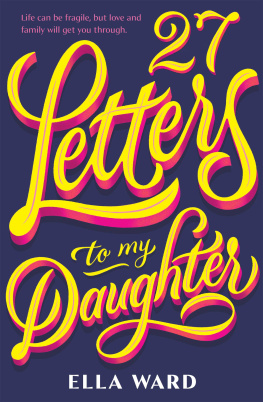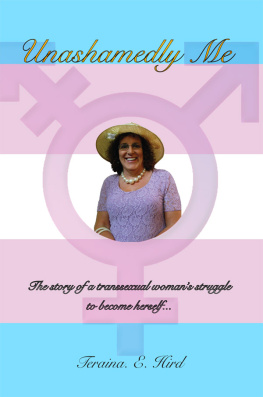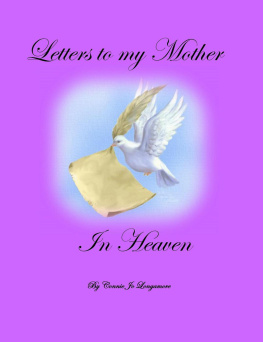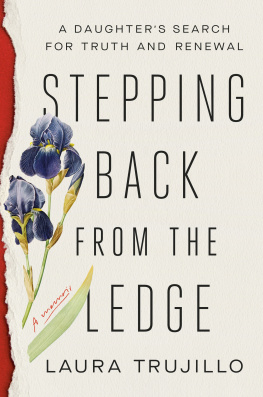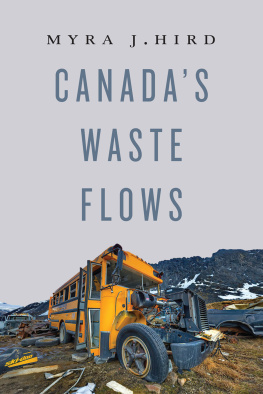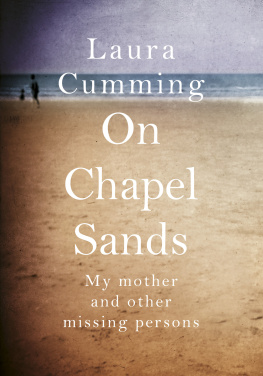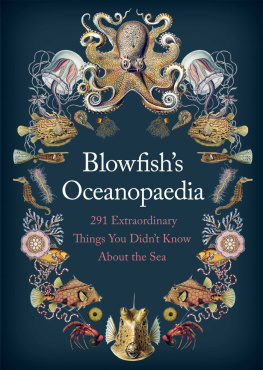The relationship we have with our mothers is perhaps the most intense of any in our lives. To be created and grow within someone for nine months and to be nurtured after our birth is the greatest privilege we have as human beings. If we have that, we have everything. But it is also a relationship fraught with contradiction and confusion because of its intensity. We all have mothers. We love them, we fight with them, we resent them, we feel guilty for resenting them, we tell them the things that only mothers get excited about.
I hope this book will comfort anyone who is going through the anguish of adolescence, whether as a child or parent; anyone suffering or having to watch a loved one suffer from an illness; the bereaved; anyone who has argued or fallen out with siblings or a best friend; anyone who has to deal with being far away from the people they love either in distance or emotionally. It is dedicated to anyone who has ever had to let go of the thing they love most.
From as far back as I can remember my mum had a compulsion to communicate whether through conversation, sharing literature, writing letters, acting or listening to music in the communal solitude of a concert hall. Even while I was still in the womb, she told me she used to read me poetry, play me her favourite records and sing to me. From my infancy she took great pleasure in nurturing me with books and music. My childhood is awash with memories of her reading me books and poems: Brownings Pied Piper ofHamelin, for which I still have the original beautifully illustrated book by Kate Greenaway, and John Masefields Cargoes which was one of the most exotic things I had ever heard. I loved being able to visualise each ship through the rhythm and pace alone, from the mysterious and beguiling Quinquireme of Nineveh from distant Ophir to the strange relief I used to feel when the dirty British coaster turned up at the end. Mum used to encourage me to use all my senses when I was listening to it and I can still remember the images it conjured.
Alfred Noyes The Highwayman was another poem that engulfed all my senses. Mum, as a frustrated actress, used to read this in a way that was almost cinematic. The sounds of the horses hooves (Tlot-tlot; tlot tlot) growing gradually louder each time the Highwayman approached and the cracking of his whip set against the warm earthiness of language used when Bess is being described were addictive. All these wonderful images and the passion and romance of it all I just loved. I always cried, as did mum, when the highwayman died at the end, emotionally drained from the intensity with which shed read it. The landlords black-eyed daughter, Bess, had a lot to answer for.
I remember mum reading me Burns Tam o Shanter for the first time when I was learning to recite To a Mouse for the Burns Competition at primary school and it feeling like the first real adult piece of writing Id ever experienced. The wicked relish with which Burns describes all the grotesque items Tam sees lying on the haly table and the part when his horse gets its tail pulled off used to make me scream for mercy, before begging mum again.
Robert Louis Stevensons poem The Land of Counterpane from A Childs Garden of Verses Ill always associate with a hand-stitched quilt that mum and dad inherited when dads mum died. It was a rose-coloured nylon. Dad used to have to get up early to leave for his work at the brewery at Sighthill at six each morning (to walk the three or so miles there before buses ran that early). Hed come through and give me a kiss on the way out, then Id run through to spend the next few hours under the quilt in the big bed with mum. It also reminds me of pretending to be ill so I could stay off school under the land of counterpane in mum and dads bed, daydreaming, just as mum had loved to read it when she was suffering from childhood rheumatic fever, and similarly physically, but not imaginatively confined. Stevensons own childhood illness had been his inspiration for writing the poem in the first place.
Other favourites were M.C. Smiths The Boy on the Train, more commonly known as The Next Stops Kirkcaldy which we would recite on the way over to Burntisland and Kirkcaldy for the yearly fairs on the Links there. We could eventually time it so we were actually going under the tunnel at the line, Were into the tunnel! Were a in the dark! But dinna be frichtit, Daddy. And Hilda Boswells Treasury of Poetry (Leery the Lamplighter, Mrs Peck-Pigeon, They Went to Sea in a Sieve and The Wraggle Taggle Gypsies) again, illustrations I can still see clearly and words I hear mum reading to this day. The poem No Telephones in Heaven from L.P. Hartleys Five-Minute Recitations used to make me cry for hours, as the telephone was always a big part of mums life and I couldnt bear to imagine a time that she might not be there any more.
Mum and dad were both compulsive readers. Dad used to go to Fountainbridge Library for them every Tuesday on his way back from work and return with a dozen or so books which they would devour and exchange thoughts about over the following week. They always used to enjoy having a few books on the go at the same time. Dad knew exactly the kinds of things mum liked. One of his greatest pleasures was discovering newly published books that mum hadnt had the chance to hear about yet. They also used to enjoy exchanging their favourites mums biographies of actors, singers, conductors and books about old Edinburgh and Scottish history, plus collections of poetry shed pick up at jumble sales and second-hand shops, and dads crime fiction, Pan books of horror stories and his all-time favourite, the classic Glasgow gang novel NoMean City.
Mum made sure I knew how to read before I started primary school aged four. Through taking the occasional boarder in the front room, and dad doing odd-jobs in the evenings at Cam and Jims (family friends who run a guest house in the centre of town), mum was able to give up work when I was born until I was eight. She was therefore able to spend time each day reading and teaching me to read from the beautifully illustrated books Ive mentioned. With her encouragement I had my first poem published in the Evening Newss Junior News when I was five and she was forever uncovering writing and painting competitions for me to enter, in which I was quite successful. (Possibly, I thought, because I was the only kid entering them.) Sometimes, if I felt more inclined to play Scalextric or Action Man with my friend, Mark, next door, dad and she would collaborate instead. Dad was an enthusiastic amateur artist and mum would hone his more elaborate style then add her own touches to produce poster-paint pictures reminiscent of her favourite artist, L.S. Lowry. One of dads proudest solo projects in my name was a competition to design a dinosaur. Here, given free reign by mum he produced a lavish dragon who they named the Hirdigorous which was featured on sweetie cigarette cards at the time.
In the numerous competitions I/we entered over the years I won bikes, toys, helicopter flights, tape recorders, John Menzies book tokens, singing Sindy dolls, wristwatch radios and, on one occasion, my dream come true the chance to meet the Scottish entertainer Jimmy Logan, who Id developed a crush on after seeing him in pantomime and listening to mums Harry Lauder records. Mum chummed me along to meet him, he was a charming man, and he subsequently sent us a Christmas card each year for the rest of his life. He also gave us a lucky rabbits paw which mum cherished and would always stroke for luck when she was at a low ebb. I remember the first time I met Jimmy Logan, he asked me what my daddy did for a living, and when I told him he worked in a brewery he roared with laughter. I never really understood at the time what the joke was.

